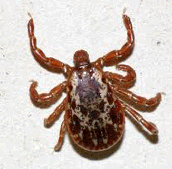Heartworm
Heartworms are parasites that are contracted by mosquito bites and live their adult lives in the chambers of the pet's heart. This parasite is life threatening, making prevention so important. For dogs and cats we recommend a monthly oral preventative called Heartgard or Sentinel (or Revolution for cats) to prevent heartworm and other internal parasites. This can be given as soon as the first puppy or kitten visit at 8 weeks.

Roundworms
Roundworms are contracted several ways: *Consuming infective worm eggs from soil in the environment (generally through grooming) *consuming a prey animal (usually rodents) carrying the developing worm
*Nursing from an infected mother (most puppies and kittens are infected during embryonic development when an infected mother dog/cat is pregnant).
Signs of roundworm infestation are a pot belly,gassy intestines, sometimes diarrhea, poor condition, and in extreme cases worms in stool or vomiting worms. We recommend a monthly oral preventative called Heartgard or Sentinel (or Revolution for cats) to prevent roundworms and other internal parasites. This can be given as soon as the first puppy and kitten visit at 8 weeks.
**Humans can also be infected with roundworms**

Hookworms
Hookworms are contracted in several ways: *Ingestion - contaminated food or water, moist surfaces, or consuming an animal infected with hookworms. *Through the uterus or milk - larvae can migrate to the uterus and mammary glands *Through the skin - larvae enters the skin then migrates through the bloodstream to the lungs and trachea, are then coughed up and swallowed.
Signs of hookworm infestation are diarrhea, pot belly, gassy, anemia, poor or weak condition. We recommend a monthly oral preventative called Heartgard or Sentinel (or Revolution for cats) for dogs and cats to prevent hookworms and other internal parasites. This can be given as soon as the first puppy and kitten visit at 8 weeks of age.
**Humans can also be infected with hookworms**

Whipworms
Whipworms are contracted from consumption of food or water with whipworms. Signs of whipworm infestation are diarrhea, gas, anemia, and weight loss. We recommend a monthly oral preventative called Heartgard or Sentinel for dogs to prevent whipworms and other internal parasites. Whipworms are rarely found in cats. This can be given as soon as the first puppy and kitten visit at 8 weeks of age.

Tapeworms
Tapeworms are contracted from consumption of a flea infested with tapeworm eggs, or consuming a rodent or lizard infested with tapeworms. Signs of tapeworm infestation are small dried sections of tapeworm around the anus (they look like rice grains). Dogs and cats will sometimes scoot on their rear end due to irritation. We recommend bringing in a stool sample to determine if your pet has tapeworms. We can then dispense some medicine.

Fleas
Fleas are commonly found in this area. Fleas can spread tapeworms and lead to flea bite dermatitis. We recommend a monthly dose of Parastar-Plus or Sentinel for dogs. Revolution and Easy Spot are products for cats.

Ticks
Ticks can spread many serious diseases such as Lyme Disease, Anaplasmosis, and Erlichiosis. We recommend an annual Idexx 4DX test to detect tick borne diseases as well as using Parastar-Plus to protect from ticks.



Dog tick Brown tick Deer tick
